2023 年四川泸州中考英语真题及答案
说明:
1. 本试卷分为第一部分(选择题)和第二部分(非选择题)两部分。第一部分(选择题)
第 1 至 6 页,第二部分(非选择题)第 7 至 8 页。
2. 第一部分(选择题)满分 70 分,第二部分(非选择题)满分 50 分,全卷满分为 120 分;
考试时间为 120 分钟。
3. 答卷前,考生务必将自己的姓名、准考证号填写在答题卡上,并在规定位置粘贴考试用
条形码。答卷时,考生务必将答案涂写在答题卡上,答在试题卷上无效。考试结束,将试
卷和答题卡一并收回。
注意事项:
第一部分(选择题 共 70 分)
每小题答案选出后,用 2B 铅笔把答题卡上对应题目的答案标号涂黑。如需改动,用橡皮擦
干净后,再选涂其它答案。
一、基础知识运用(共两节;满分 30 分)
第一节 单项选择(共 10 小题;每小题 1 分,满分 10 分)
从 A、B、C、D 四个选项中,选出可以填入空白处的最佳答案,并把答题卡上对应题目的答
案标号涂黑。
1. — Do you want to watch the basketball game in the park?
— ________, but I have to do the chores first.
A. I'm afraid not
B. I'd love to
C. Never mind
D. Of course
not
2. — Which teacher will you miss the most after graduation?
— Mrs. Chen. She encouraged me a lot when I ________ the English exam.
A. fail
B. was failing
C. failed
D. have failed
3. — Last month, thirteen Chinese scientists successfully reached the peak of Mount
Qomolangma which is ________ mountain in the world.
— Wow! It's really fantastic. I am so proud of them.
A. high
B. higher
C. highest
D. the highest
4. — There are two books about Chinese traditional tea-making culture.
— You're free to take ________ of them and leave one for me.
A. all
B. either
C. neither
D. none
5. — What are you going to do this summer vacation?
— I plan ________ Hua Hua, a nearly 3-year-old lovely panda in Chengdu.
A. see
B. saw
C. seeing
D. to see
6. The 18th China International Alcoholic Drinks Expo ( CIADE) ________ in Luzhou
from April 13th to April 16th, 2023.
A. was held
B. is held
C. will be held
D.
has
been
held
7. — Congratulations! Can you share your secret to learning?
— If you work hard enough, you will succeed ________ achieving your goal.
A. on
B. about
C. in
D. for
8. — Mum is too busy to make dinner for us.
�
— Let's do it ourselves, ________ we shouldn't depend on our parents too much.
A. so
B. because
C. but
D. or
9. — I'm worried about leaving my friends and going to a new school.
— Take it easy. I'm sure you'll ________ your classmates if you are friendly to
them.
A. get along with
B. catch up with
C. get together with D.
come
up
with
10. — Do you know Liu Cixin, the writer of a famous science fiction SanTi? I wonder
________.
— In June, 1963.
A. when was he born
B. where he was born
C. when he was born
D. where was
he born
第二节 完形填空(共 20 小题;每小题 1 分,满分 20 分)
通读下面的短文,然后从后面各题所给 A、B、C、D 四个选项中选择可以填入空白处的最佳
答案,并把答题卡上对应题目的答案标号涂黑。
A
C919, the first China-made large passenger airplane, completed its commercial
flight (商业飞行) on May 29th, 2023.
The plane took
Airport and safely
11
12
at 10:32 a.m. from Shanghai Hongqiao International
at Beijing Capital International Airport at 12:31 p.m.
After landing, it was welcomed with a water salute (水门仪式).
There
13
over 130 passengers who experienced C919's first air travel. At
the beginning of the journey, China Eastern Airlines (CEA) provided everyone on board
with a specially designed ticket.
"Sitting in the airplane C919, I felt very excited and proud. And I'm lucky enough
to be
14
the history." said Zhang Keli, a passenger from Beihang University
in Beijing.
The event shows that our country is able to build a world-class airplane
independently, and it also plays
15
important role in the development of
China's civil aviation industry (民航工业).
11. A. off
12. A. arrive
13. A. are
14. A. parts
15. A. a
B. away
B. arrives
B. were
B. parts of
B. an
C. up
C. arrived
C. has
C. a part
C. the
B
D. in
D. arriving
D. had
D. a part of
D. one
Once upon a time, there lived a fox and a stork (鹳) in a forest . One day the
fox asked the stork to dinner, with the naughty purpose of playing a
16
on
his guest.
The stork came at the hour
17
, with a good appetite for her meal. But she
was little
18
on finding that it was made of meat, served up in a shallow (浅)
dish. With her long slender bill (细嘴), she could
19
pick up enough food to
�
satisfy a tinny bird! The fox kept eating all the time, only
20
a moment to
say, "I hope, madam, that you enjoy your big meal? Don't you
21
that my
specially-prepared meal is first-grade?"
The stork made no
22
, but left, hungry and much displeased, from the almost
23
meal.
A few days afterwards, the stork returned the fox's invitation by asking him
to dinner.
The fox hurried to the place of meeting,
24
the stork had made ready her
meal. The fox became greatly dissatisfied,
25
the food served up in a
long-necked jar (罐), which let in the stork's slender bill,
26
he could not
stick into the jar even his sharp nose!
"I hope, sir, that you like your big meal?" said the stork, who was not
27
enough to return good for evil (恶), and who wished to give the fox a
28
. And
as the hungry fox looked sadly up into
cannot take a joke in good part should
29
30
face, the stork added, "Those who
make one. Never do to others what
you would not like them to do to yourself."
16. A. song
B. drama
C. trick
D. guess
17. A. agreed
B. imagined
C. introduced
D. finished
18. A. surprised
B. pleased
19. A. nearly
B. really
20. A. catching
B. counting
21. A. think
22. A. mistake
23. A. untasted
B. explain
B. decision
B. uncooked
24. A. whether
B. unless
C. troubled
C. exactly
C. stopping
C. believe
C. reply
C. unmixed
C. where
D. scared
D. hardly
D. getting
D. remember
D. notice
D. untouched
D. although
25. A. laughing at
B. staring at
C. looking for
D. waiting for
26. A. but
27. A. lucky
28. A. meal
29. A. my
30. A. never
B. or
B. kind
B. gift
B. your
B. ever
C. so
C. curious
C. beat
C. his
C. sometimes
D. if
D. patient
D. lesson
D. her
D. often
二、阅读理解(共 20 小题;每小题 2 分,满分 40 分)
阅读下面短文,从每题所给 A、B、C、D 四个选项中选出最佳答案,并把答题卡上对应题目
的答案标号涂黑。
A
It's reported that Shenzhou-16 will bring international paintings by teenagers
from 10 African countries to the China Space Station.
Jing Haipeng, one of the astronauts for the Shenzhou-16 manned spaceflight
mission, shared the information during the Shenzhou-16's press conference (新闻
发布会) at the Jiuquan Satellite Launch Center in Northwest China's Gansu Province
on Monday.
These paintings were beautifully drawn by teenagers from 10 African countries
�
including Algeria, Democratic Republic of the Congo (DRC), Egypt, Madagascar, Mali,
Mauritius, Nigeria, Somalia, South Africa and Zimbabwe.
"Indeed, we have this special and meaningful purpose, which is to show
international paintings for the first time on the China Space Station, and these
excellent works are from the winners of 'Tianhe Award' for young friends from the
10 African countries," Jing explained.
"At present, we have not seen the paintings. I believe they will be bright.
Exploring the vast universe (宇宙) is the common dream of all human, no matter the
race, age, or nationality. We look forward to joining hands with all peace-loving
people to create a better tomorrow," he continued.
"We will take the children's best youth, best friendship, and best dreams into
space, plant the seeds (种子) of science, friendship, and dreams on the China Space
Station, and let them grow and bear fruit," Jing hoped.
31. What does Jing Haipeng do?
A. A reporter.
B. An artist.
C. A gardener.
D. A spaceman.
32. Where are some of the teenagers mentioned from?
A. Egypt, Mauritius and Mexico.
B. Mali, Colombia and Zimbabwe.
C. Madagascar, Algeria and Somalia.
D.
Nigeria,
South
America
and
Madagascar.
33. What did Jing Haipeng think of these paintings?
A. Wonderful.
Fashionable.
B. Funny.
C. General.
D.
34. Which of the following is true?
A. The paintings were chosen from Chinese teenagers.
B. The paintings have not been shown before in space.
C. Jing Haipeng has seen the paintings when interviewed.
D. The winners of "Tianhe Award" can get a space ticket.
35. What's the main theme of the passage?
A. Human and nature.
C. Science and technology.
education.
B
B. Peace and friendship.
D. Culture and
Two years ago, I was sitting in my car waiting in a long line for a toll (通
行费) station. When I finally reached the station, the toll station worker told me
that the person in front had paid for me and I was free to go. I was so shocked.
I didn't need to save the 5 dollars. I would never know who he was. I was tired by
the heavy traffic and the long line, and that behavior was surprising and
unbelievable, which really touched my heart. So I decided to pay for the next car
waiting in line.
The first time I tried to pay forward the toll, I kept looking into my rear view
mirror (后视镜) to see who I'd be paying for. In the mirror, I saw a tired looking
taxi driver. And I felt satisfied that my money would be going to a good place. But
�
before we got to the toll station, the taxi driver had suddenly changed his way and
now there was someone else behind me. She looked upset and was gesturing (举止)
angrily in a conversation with her friend. I wasn't willing to be paying for a woman
like that and was certainly judging her by what I was seeing in the mirror. Anyway,
I paid the toll for both of us and left.
Thirty seconds later I was surprised to hear a honk (鸣笛声). It was the woman
and her friend waving at me from the other way! She looked cheerful and happy. She
wasn't what I thought she was like. This was a valuable lesson that I shouldn't judge
people so quickly…After all, I don't know their stories.
36. Who paid for the author?
A. A caring stranger.
C. A disappointed woman.
station worker.
B. A close friend.
D.
A
toll
37. Why did the author pay forward the toll?
A. He didn't need to save the money.
B. He wanted to pass on the kindness.
C. He was satisfied with the taxi driver.
D. He made a mistake because of the
tiredness.
38. How many vehicles (车辆) did the author pay for?
A. 0
B. 1
C. 2
D. 5
39. What do we know about the author from the passage?
A. He disliked the woman.
the taxi driver.
B. He helped
C. He gladly paid for the woman.
D. He changed his feelings towards the
woman.
40. What's possibly the best title for the passage?
A. An unbelievable behavior.
B. An unforgettable experience.
C. Misjudgment in the mirror.
D. Payment at the toll station.
C
Lu Hong who was listed among the finalists for Touching China 2022 was diagnosed
with cerebral palsy (脑瘫) when he as a child. His disabilities I meant that he spent
his primary and middle school years in pain. Every time he had PE class, all his
classmates could run and jump as they liked on the playground while he had to sit
alone in the classroom.
After graduation he opened his photo shop. At first, most customers would turn
away from Lu's shop because they doubted his skills and service. To get customers,
Lu promised to take pictures for free if customers were not satisfied with his work.
Thanks to his skills and hard work, Lu impressed his customers and his shop's business
grew stronger.
In 2017, with the help of the Association for Disabled People in Suzhou, Lu Hong
opened a photo factory and offered jobs to disabled people. In just a few years his
factory has developed from a small workshop to a proper company.
There are over 40 workers in Lu's factory, more than 30 of whom are disabled.
�
"It's not easy for people with disabilities to find work. I hope to provide them
with an opportunity to realize their full ability and go for their life goals," he
said.
During the epidemic, the factory was forced to close for a while, but he kept
on paying salaries (工资) to the workers as he guarded the empty factory alone.
He bought machinery and equipment worth nearly 5 million yuan ($726,000) to make
sure production when his staff could not come to work. Besides, Lu started exploring
e-commerce (电子商务) opportunities to increase income.
Today, Lu Hong's factory is a celebrated company that has made a great
contribution (贡献) to supporting the poor and providing jobs for the disabled. In
the future, he hopes to change from being helped to helping and contributing to
society.
41. What do we know about Lu Hong when he was young?
A. He had a hard time.
at sports.
B. He was good
C. He enjoyed sitting alone.
D.
He
avoided
playing
with
classmates.
42. How did Lu Hong make his shop successful?
A. By giving a good first impression.
B. By taking pictures for free.
C. By improving skills and service.
D. By providing many choices.
43. Why did Lu Hong offer jobs to the disabled?
A. To get more workers.
money.
C. To communicate easily.
support.
B. To pay less
D. To provide
44. What did Lu Hong do during epidemic?
A. He didn't pay the workers.
B. He stopped production completely.
C. He tried his best to save the company.
D. He guarded the factory with the
workers.
45.Acconding to the passage, what kind of person is Lu Hong?
A. Honest and smart.
C. Careful and friendly.
Strong-minded and responsible.
D
B. Warm-hearted and humorous.
D.
What is your first impression of bamboo in China? Is it only a kind of plant
on the food list of pandas? No! It also represents single bamboo drifting (独竹
漂), an intangible cultural heritage (非物质文化遗产) passed from generation to
generation among the people in Guizhou Province.
Single bamboo drifting has been performed for more than 2,000 years. In the past,
the ancestors who lived on the bank of the Chishui River used it as a method to go
across the river. Now, with the development of modern transportation, this skill
has been regarded as a sport or a unique way of performance by local people.
�
Middle school students of the province practice the sport and compete in the
Chinese National Games. The requirements of the sport are simple, yet demanding!
Athletes have to balance on a bamboo pole, barely as wide as one's foot, and guide
it down the river with a thin stick. But there's more than just guiding. While keeping
balance on the narrow bamboo pole with the thin stick, the athletes are performing
skills and tricks. Jumping, push-ups, and splits (劈叉) are some of the most common
ones, whereas those who are more experienced often use their imagination to try out
more difficult moves.
Yang Liu, a 25-year-old "water fairy" from Zunyi, Guizhou, dancing on the river
in traditional Chinese costume, is an inheritor (继承人) of single bamboo drifting.
For over ten years, combining drifting with dancing, Yang has put fresh energy into
this traditional art. It's not easy to stand, let alone dance on a single bamboo.
So not surprisingly, Yang has experienced countless falls and failures. Thanks to
her efforts, though, single bamboo drifting has gotten great fame on the Internet
and become well-known in the world.
46. What did we mainly use single bamboo drifting for in ancient times?
A. A kind of sport.
B. A way of dance.
C. A form of traditional art.
transportation.
D. A type of
47. What does the underlined word "demanding" probably mean in Chinese?
A. 严苛的
B. 繁琐的
C. 宽松的
D. 自在的
48. Why is a stick needed in single bamboo drifting?
A. To try out difficult moves.
B. To guide and balance.
C. To perform different tricks.
D. To practice and compete.
49. What do we know about Yang Liu?
A. She was a fairy with magical power.
B. She kept practicing for nearly 10
years.
C. She was good at the skill from the start.
D. She brought
the traditional art to modern life.
50. What mainly made single bamboo drifting famous around the world?
A. The spread of sports spirits.
B. The development of tourism.
C. The popularity of Chinese festivals.
D.
The
continuous
efforts
of
generations.
第二部分(非选择题 共 50 分)
注意事项:第二部分共 2 页,用 0.5 毫米黑色墨水签字笔答在答题卡上,不能答在试卷上。
三、完成对话(共 5 小题;每小题 1 分,满分 5 分)
根据对话内容,在每个空缺处填入一个适当的词,使整段对话意思完整。请把该空缺处的词
填写在答题卡相应的位置上。(每空限填一词)
A: Hi, Mark. I want to have a class party. Will you help me?
B: Sure, Nelly. I can help you. So
51
shall we have the party?
A: Let's have it today after class.
B: No, today is too early. If we have it today, half the class won't come.
�
A: OK, let's have it tomorrow then.
B: Hmm…There's a
52
the day after tomorrow. Students will leave early to
study for the test. Why not have it on the
53
?
A: OK, let's have it on Saturday afternoon. We can all meet and watch a video.
B: No, I
54
think we should watch a video. Some students will be bored. Let's
play party games.
A: OK, good idea. Can you organize the party games?
B: Sure, I can do
55
. And can you make some food for us?
A: Yes, no problem.
四、短文填空(共 10 小题;每小题 1 分,满分 10 分)
通读下面短文,掌握其大意,然后从短文后面的括号内选出可以填入短文空格处的词并将该
词的字母代号(不写出该词)填写在答题卡相应的位置上。
Reading and writing poems is a very personal experience. Poets use language as
a way of expressing their feelings. Poets can describe the
56
of nature, a
person, a dream or a memorable event. Most people have tried writing poems
57
some time. For children, it's a good way to enjoy language and have fun with words
as well as to
58
themselves.
But teachers and psychologists (心理学家) have
59
another use for poems
as a form of therapy (疗法) to help with problems. Writing poems can help deal with
change in their lives, death or feelings of sadness or serious disease. By writing
down your feelings, you can learn to understand yourself
60
than before.
Poems might be a way of telling someone
61
when you don't feel able to
talk about it face to face. Poems written as therapy can be funny too, as laughter
is also considered to be very good
62
for illness.
Students at a special school in England read and write poems every day. Some
of the poems that
63
write are very good, but their reason for writing is not
just to be creative. All of them have some mental and
64
problems. But by
writing poems, students are growing in self-confidence. The poems provide a channel
for them to communicate with the world and express their feelings. They
65
help them to find out and work out their problems and to develop a positive attitude
to life.
(A. they
B. beauty
C. also
D. physical
E. something
F. at
G. found
H. express
I. better
J. medicine)
五、阅读短文并回答问题(共 5 小题;每小题 2 分,满分 10 分)
根据短文内容,回答文后所给出的问题,并将答案填写在答题卡相应的位置上。
Xu Xiake was an explorer of the late Ming Dynasty who travelled huge mountains
and deep valleys in China. He was one of the greatest explorers in Chinese history.
Xu's travels were totally up to him and done on his own. He travelled so that
his feet could feel strong winds beat his body; he travelled so that his feet could
kiss the soil of the mountains.
After his death, Xu left behind his famous book, Xu Xiake's Travels, which
provides meaningful materials to the Chinese geological research. It included a
�
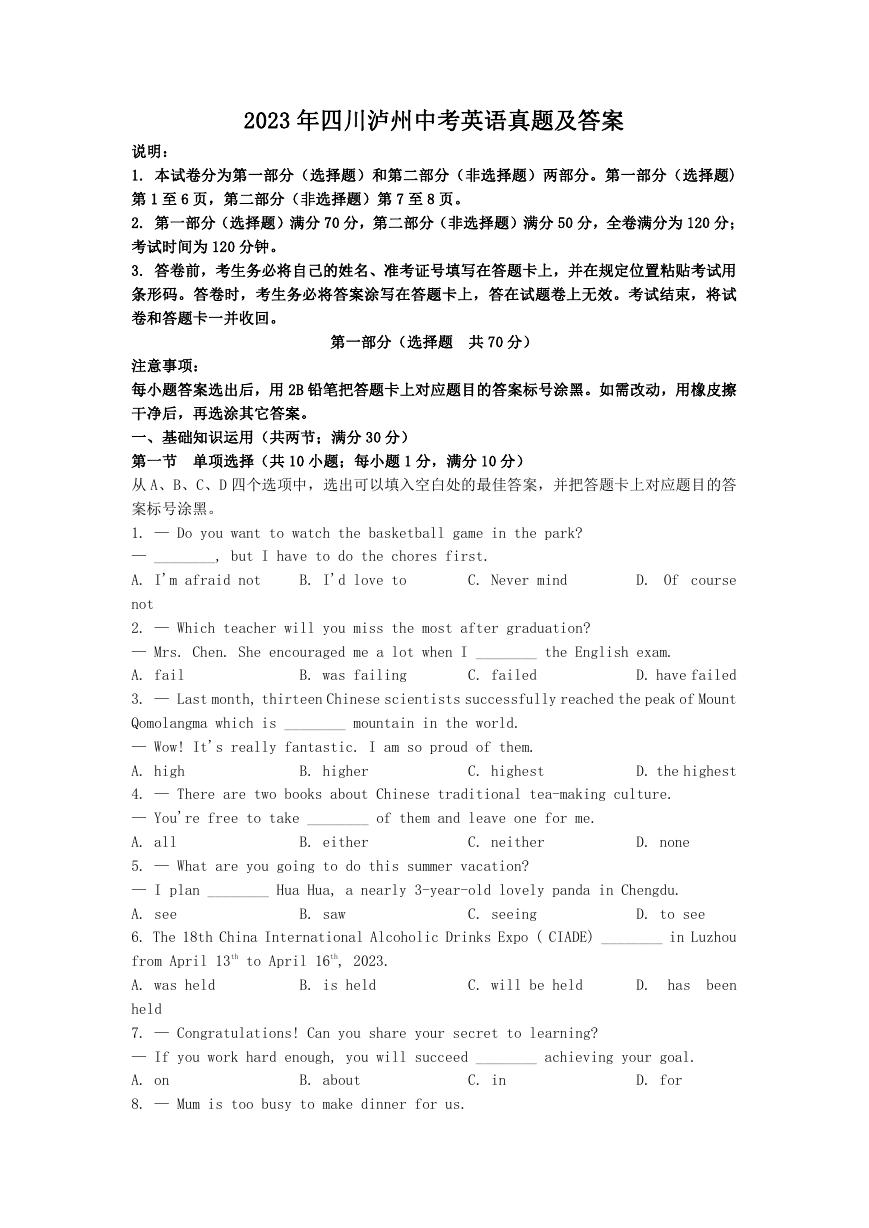


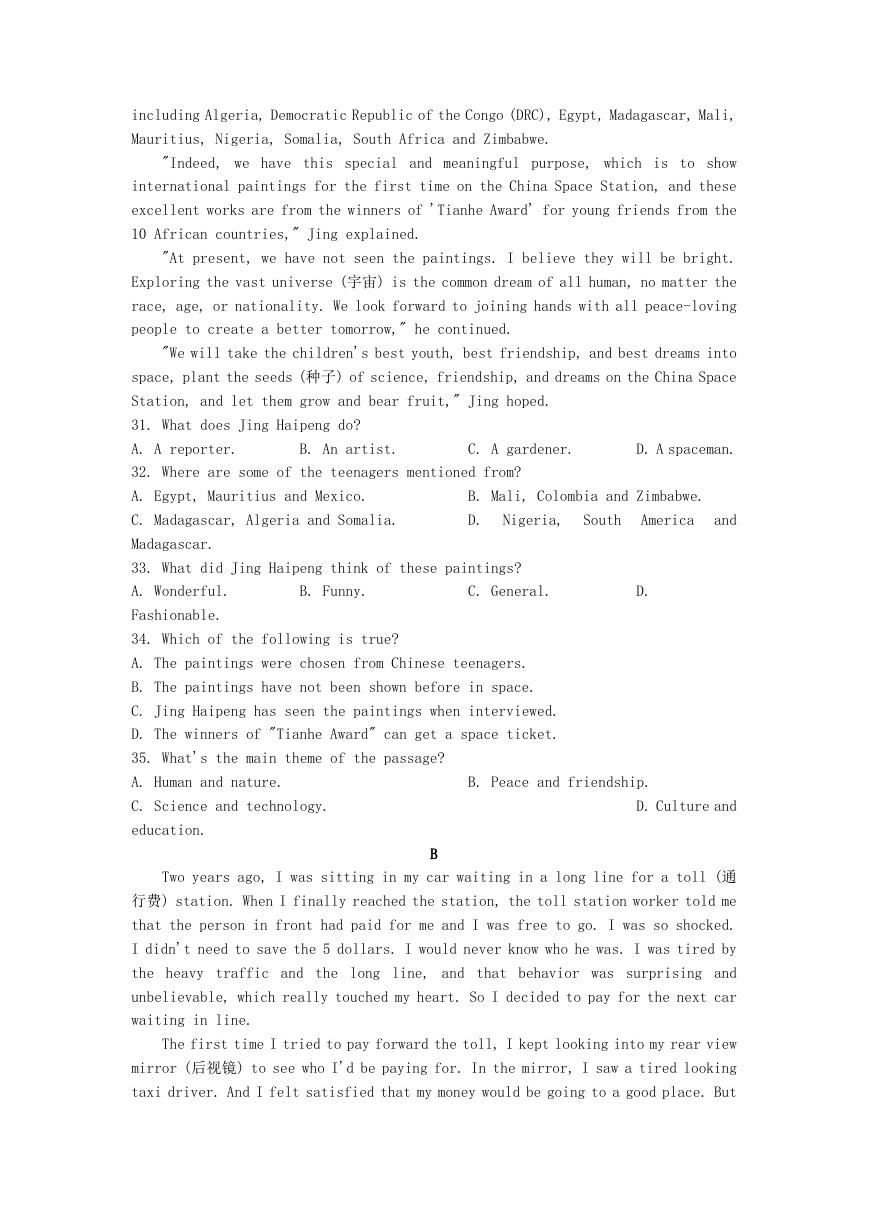
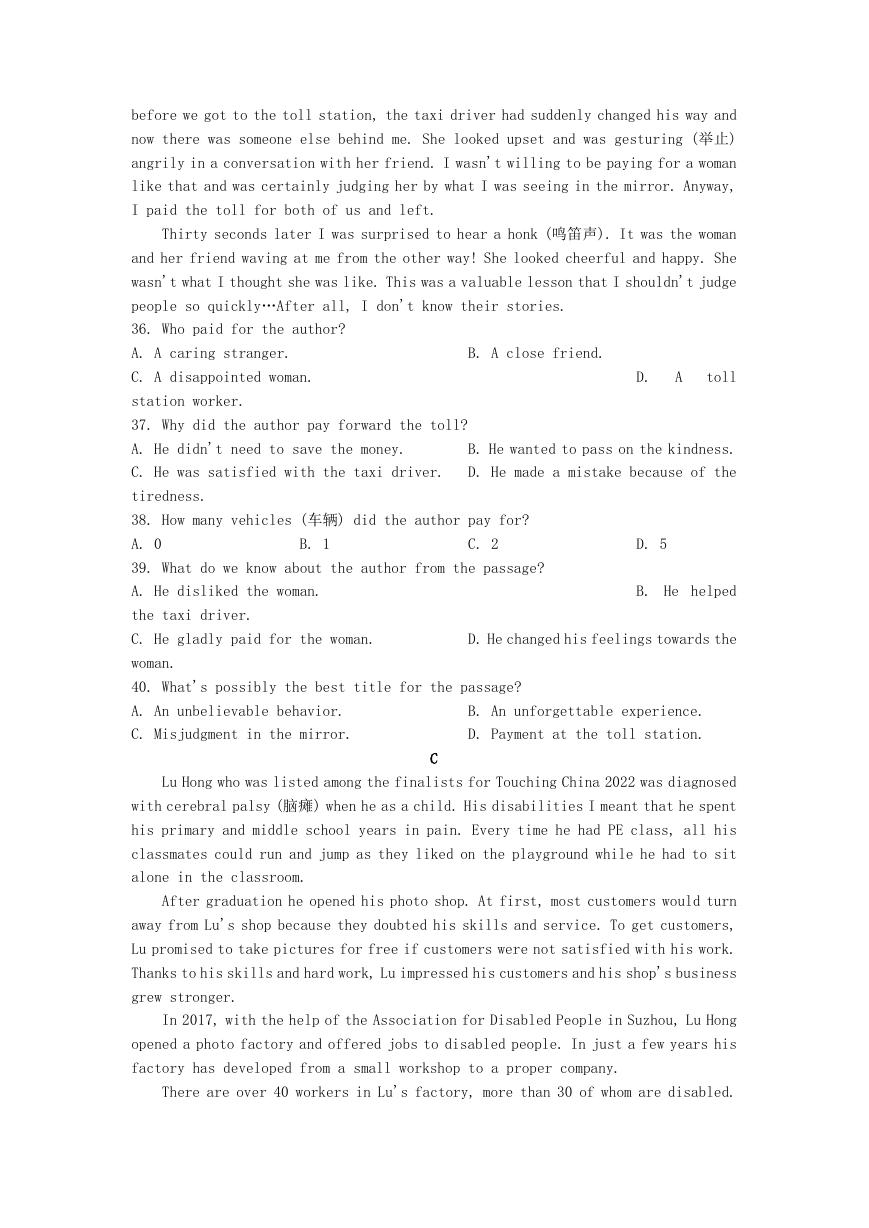
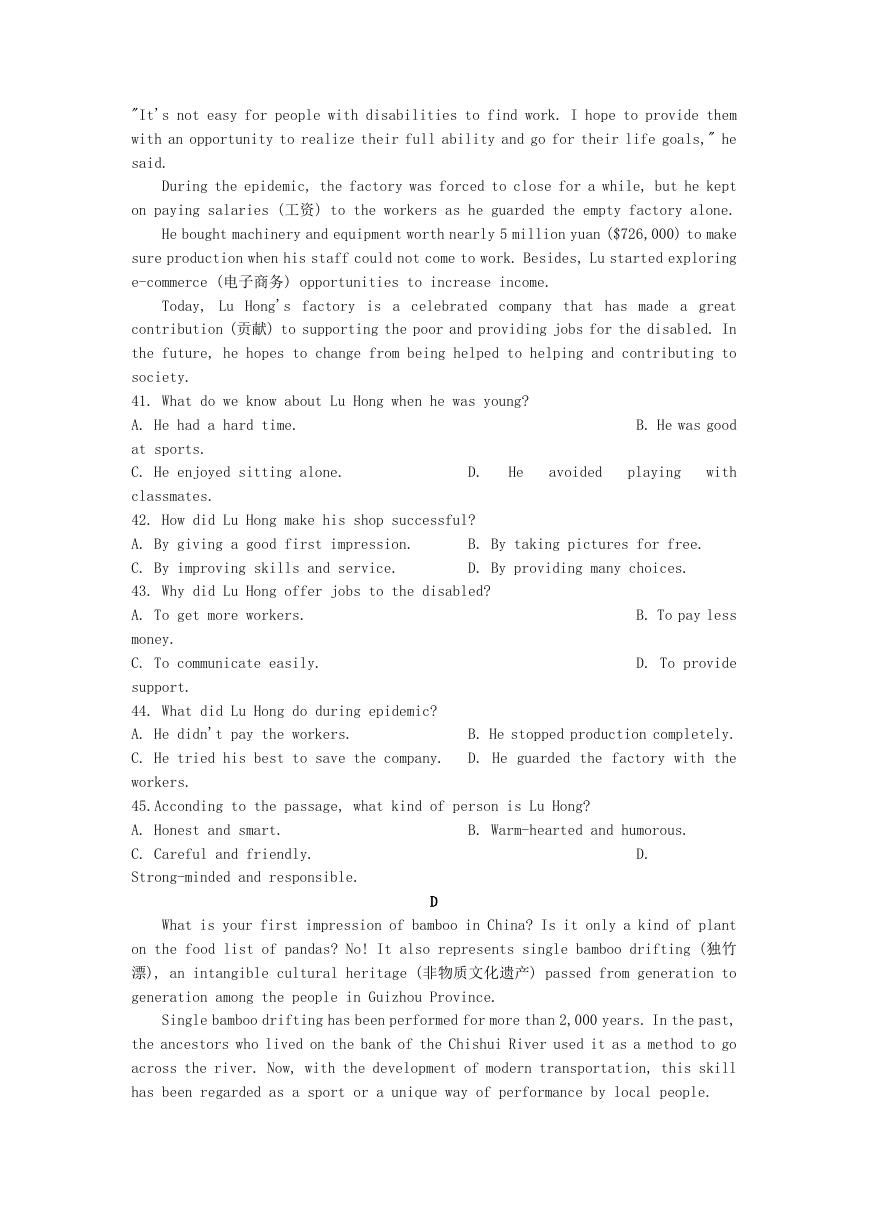
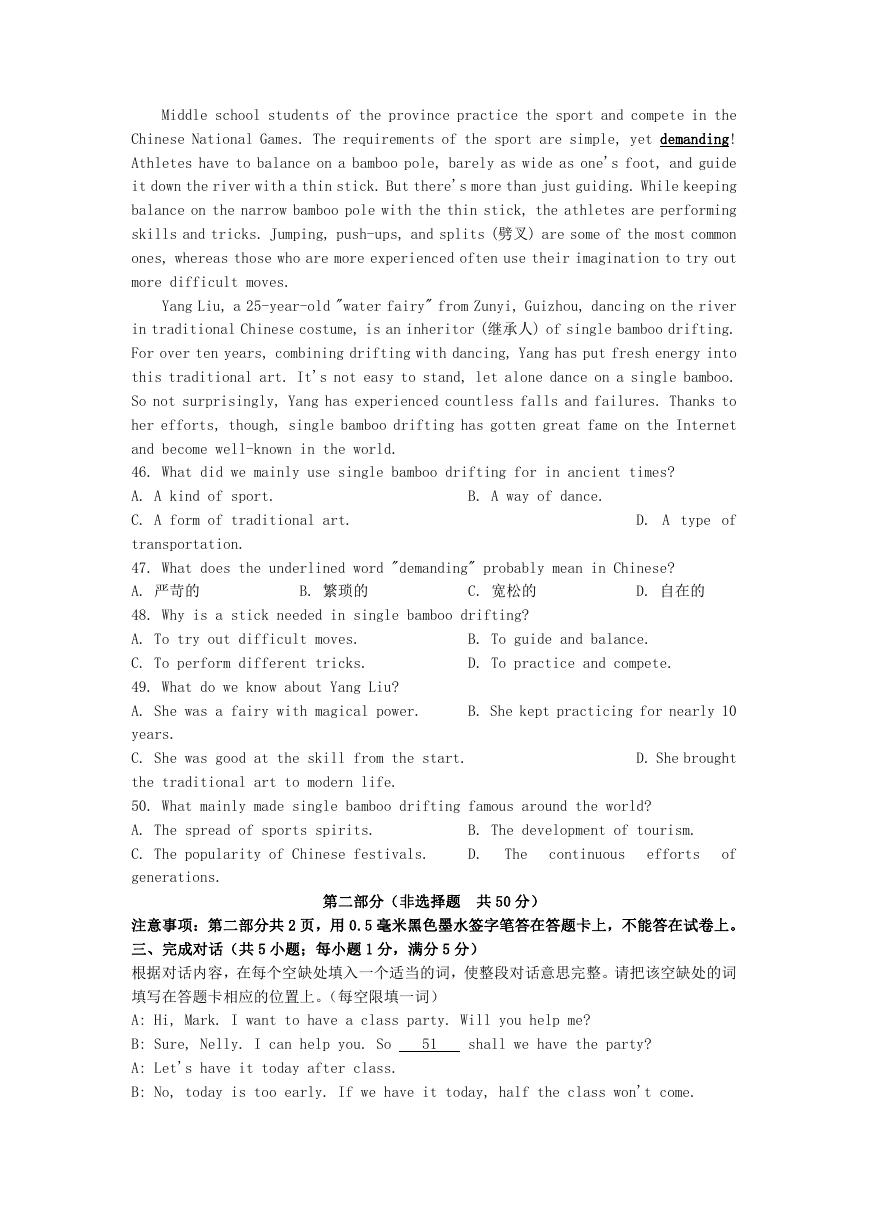
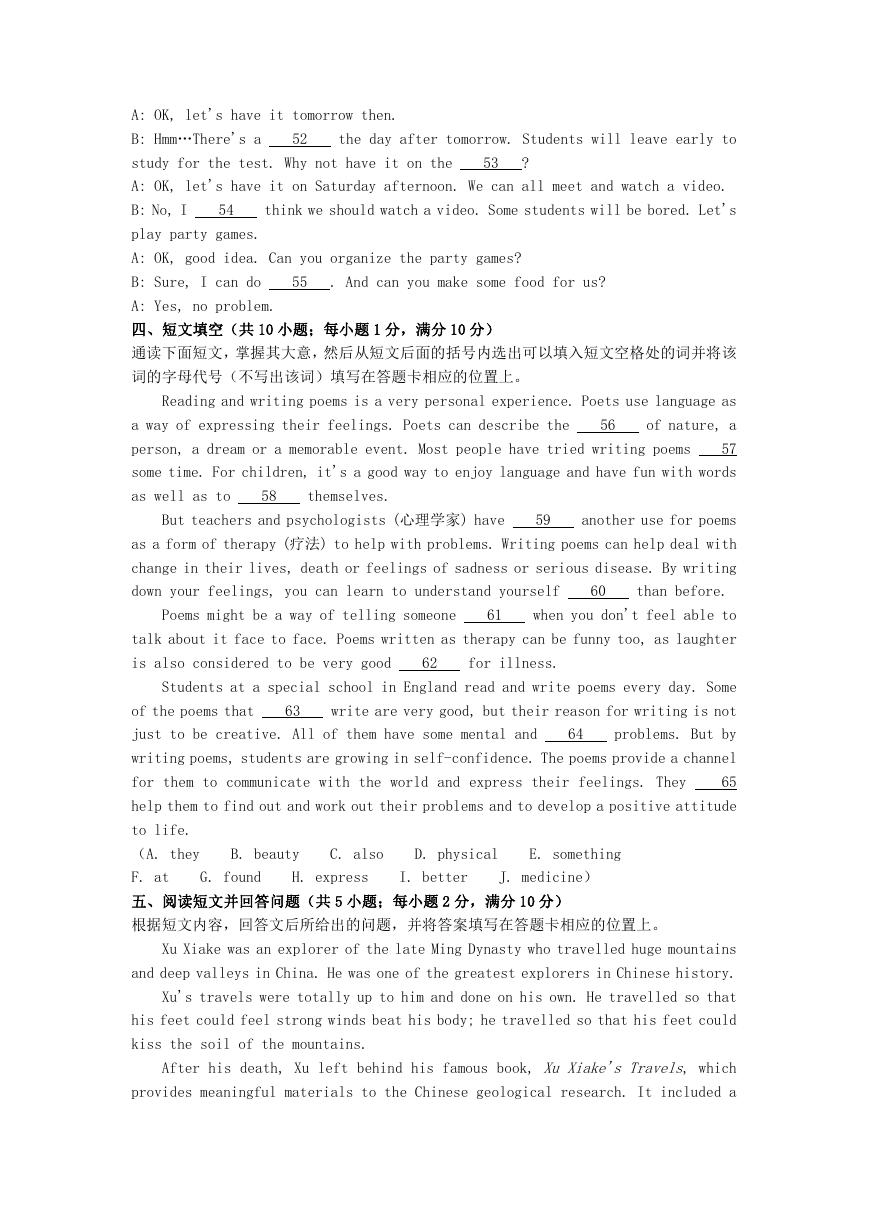








 2023年江西萍乡中考道德与法治真题及答案.doc
2023年江西萍乡中考道德与法治真题及答案.doc 2012年重庆南川中考生物真题及答案.doc
2012年重庆南川中考生物真题及答案.doc 2013年江西师范大学地理学综合及文艺理论基础考研真题.doc
2013年江西师范大学地理学综合及文艺理论基础考研真题.doc 2020年四川甘孜小升初语文真题及答案I卷.doc
2020年四川甘孜小升初语文真题及答案I卷.doc 2020年注册岩土工程师专业基础考试真题及答案.doc
2020年注册岩土工程师专业基础考试真题及答案.doc 2023-2024学年福建省厦门市九年级上学期数学月考试题及答案.doc
2023-2024学年福建省厦门市九年级上学期数学月考试题及答案.doc 2021-2022学年辽宁省沈阳市大东区九年级上学期语文期末试题及答案.doc
2021-2022学年辽宁省沈阳市大东区九年级上学期语文期末试题及答案.doc 2022-2023学年北京东城区初三第一学期物理期末试卷及答案.doc
2022-2023学年北京东城区初三第一学期物理期末试卷及答案.doc 2018上半年江西教师资格初中地理学科知识与教学能力真题及答案.doc
2018上半年江西教师资格初中地理学科知识与教学能力真题及答案.doc 2012年河北国家公务员申论考试真题及答案-省级.doc
2012年河北国家公务员申论考试真题及答案-省级.doc 2020-2021学年江苏省扬州市江都区邵樊片九年级上学期数学第一次质量检测试题及答案.doc
2020-2021学年江苏省扬州市江都区邵樊片九年级上学期数学第一次质量检测试题及答案.doc 2022下半年黑龙江教师资格证中学综合素质真题及答案.doc
2022下半年黑龙江教师资格证中学综合素质真题及答案.doc